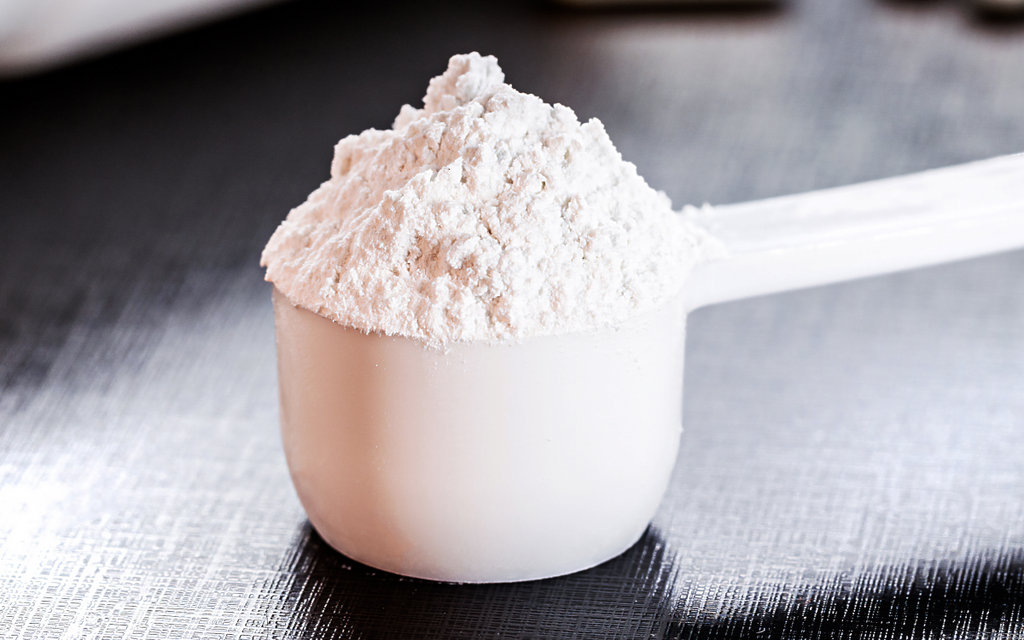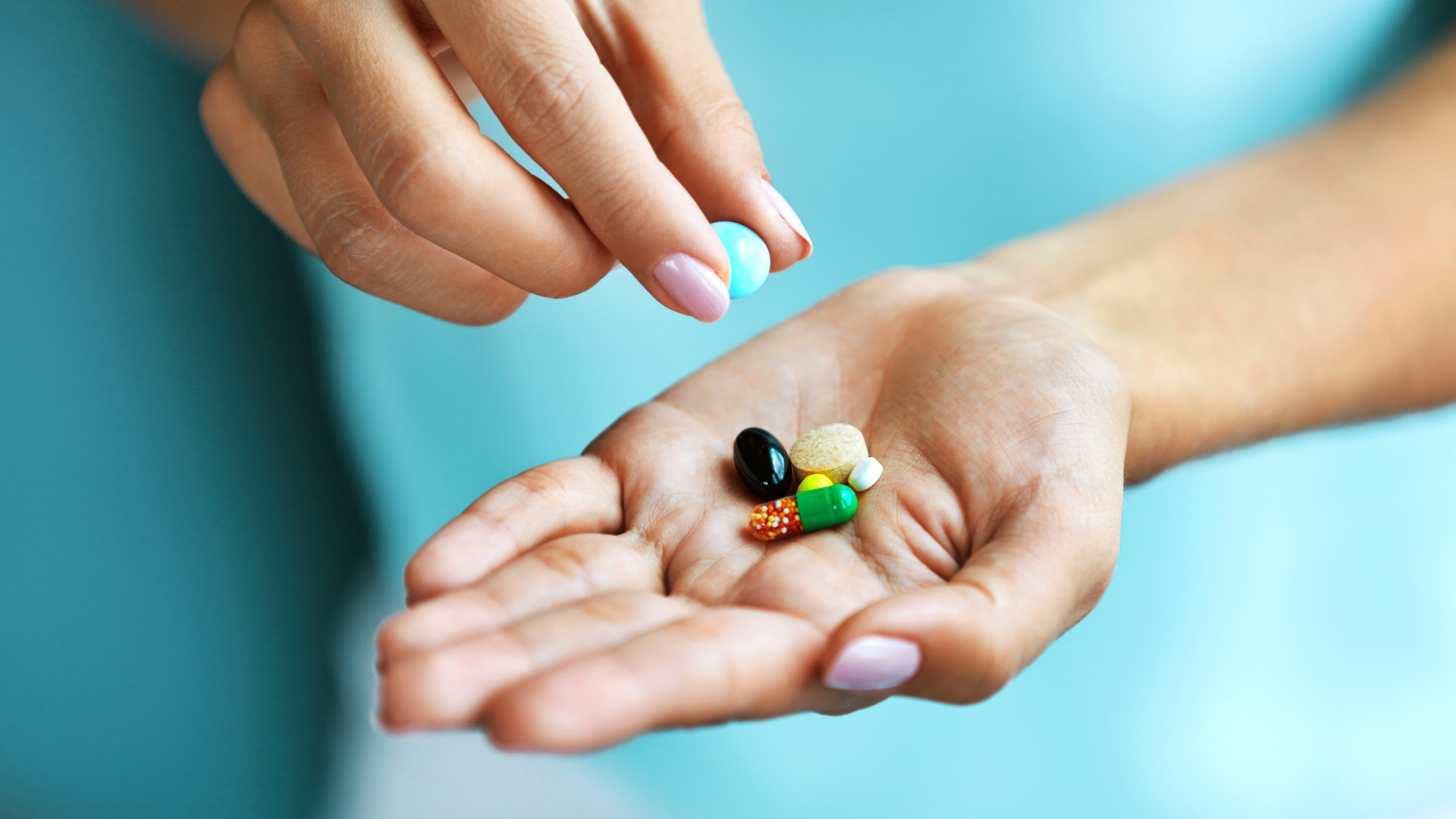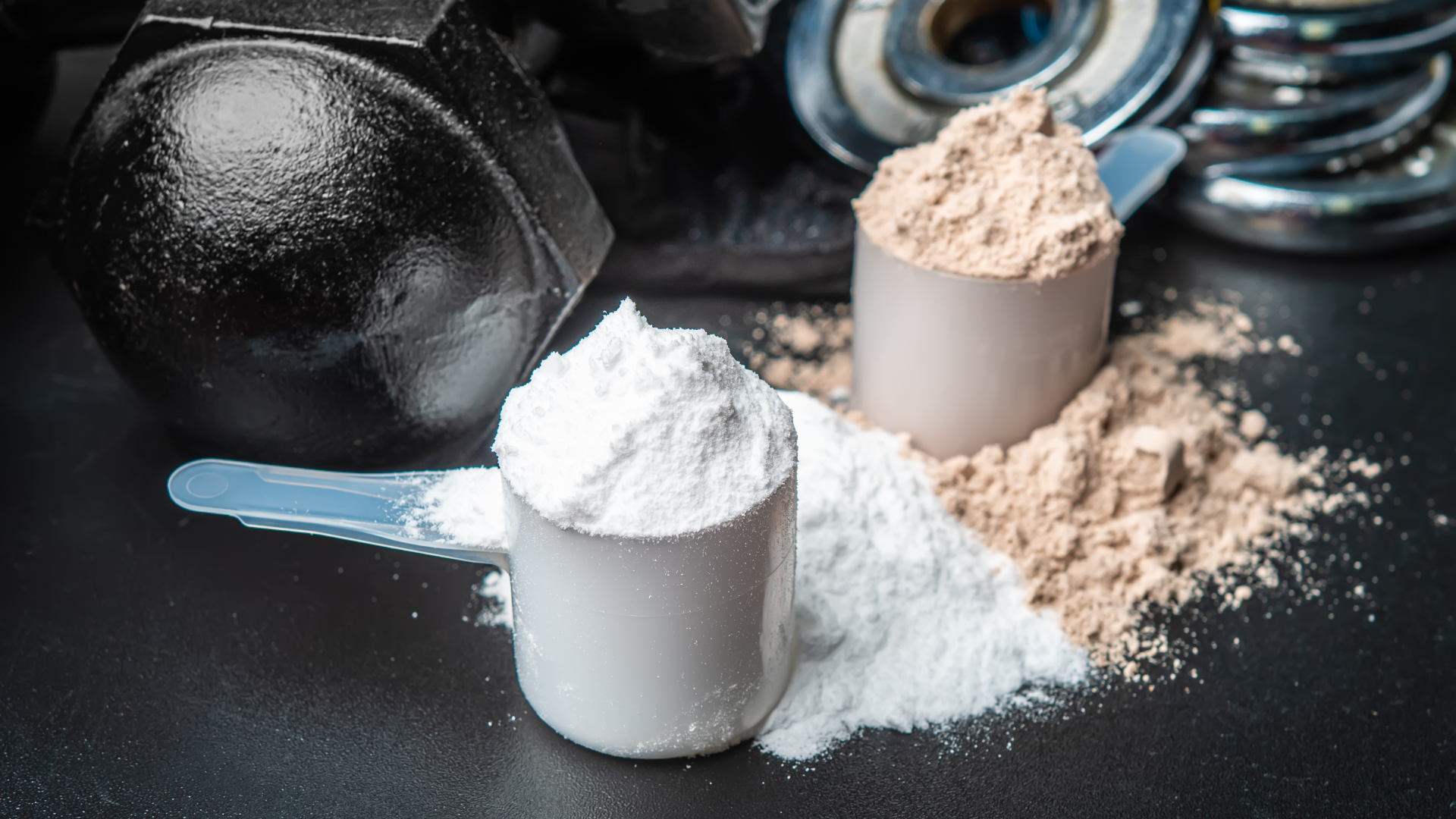Grab your cheat sheet |
Are you looking for a creatine powder, but you’re not quite sure where to start? We’ve got the ultimate guide on the best creatine powders of 2024.
If you’re scouring the internet for the best creatine, look no further. Our no-nonsense guide provides you with the top performers of 2024, catering to a range of goals from muscle growth to cutting phases.
We’ll help you navigate the key factors—like solubility, taste, and dietary considerations—ensuring you make the right pick without the hard sell.
Here, we’ll dive into the benefits of taking creatine, the side effects, the different types of creatine and dosage recommendations.
Ready? Let’s go.
What is creatine?
Creatine is a naturally occurring compound found in red meat and seafood. It’s also produced by the body in small amounts—mainly in the liver, kidneys, and pancreas. Creatine plays a crucial role in the production of adenosine triphosphate (ATP), which is the main energy source for muscle contractions.
When you consume creatine through food sources or supplements, it gets converted into phosphocreatine, which is stored in muscles.
During high-intensity exercise, like weightlifting or sprinting, phosphocreatine donates a phosphate molecule to ADP (adenosine diphosphate), forming ATP, which provides rapid energy for muscle contractions.
Supplementing with creatine has been extensively studied and shown to have several potential benefits for athletes and fitness enthusiasts.
What are the benefits of taking creatine?

Creatine supplementation has been extensively researched, and numerous studies have demonstrated various benefits associated with its use.
Here are some of the key benefits of taking creatine…
Increased muscle strength and power
One of the most well-known benefits of creatine supplementation is its ability to enhance muscle strength and power.
Creatine helps replenish ATP, the primary energy source for muscle contractions during high-intensity activities like weightlifting and sprinting. This can lead to improved performance in strength-based exercises and sports.
Enhanced muscle growth
Creatine has been shown to increase muscle mass by promoting muscle protein synthesis and cell volumization.
By increasing water content within muscle cells, creatine supplementation can lead to a fuller appearance and potentially greater muscle growth over time, especially when combined with resistance training.
Improved exercise performance
Creatine supplementation has been linked to enhanced performance during high-intensity, short-duration activities such as sprinting, jumping, and cycling.
It may also improve performance in repetitive bouts of intense exercise with short recovery periods, allowing individuals to maintain power output for longer durations.
Faster recovery
Some research suggests that creatine supplementation can accelerate post-exercise recovery by reducing muscle damage and inflammation.
This can lead to less muscle soreness and stiffness following intense workouts, empowering fitness lovers to train more frequently and with higher intensity.
Neuroprotective effects
Creatine may have neuroprotective properties and could benefit brain health. Studies suggest that creatine supplementation may protect against neurological diseases, improve cognitive function, and enhance brain energy metabolism. It’s a real powerhouse.
Who should not take creatine?
While creatine is generally considered safe and well-tolerated for most people when taken at recommended dosages, there are certain people who may need to exercise caution or avoid creatine supplementation altogether.
Here are some groups who should approach creatine supplementation with caution or consult with a healthcare professional before use.
Individuals with kidney disease
On the whole, creatine is excreted by the kidneys. So people with pre-existing kidney conditions should avoid creatine supplementation or use it under medical supervision.
While there's limited evidence to suggest that creatine supplementation may worsen kidney function in healthy people, those with kidney disease may be at increased risk of complications.
People with liver conditions
Since the liver plays a role in creatine synthesis, people with liver disease should use creatine supplements cautiously or avoid them altogether. Again, consulting with a healthcare professional is advised.
Pregnant or nursing women
There's limited research on the safety of creatine supplementation during pregnancy and breastfeeding.
Due to the lack of data, it's generally recommended that pregnant or nursing women avoid creatine supplements to err on the side of caution.
Young adolescents
While creatine supplementation is generally considered safe for adults when used as directed, its safety in children and adolescents is less well-established.
Some experts recommend against creatine use in individuals under 18 years of age due to concerns about potential effects on growth and development.
People taking certain medications
Creatine supplementation may interact with certain medications or supplements. If you're taking prescription medications or other dietary supplements, we advise consulting with a healthcare professional before starting creatine supplementation to avoid potential interactions or adverse effects.
Note: It's crucial to emphasise that individual responses to creatine supplementation can vary, and not everyone may experience adverse effects.
But, anyone considering creatine supplementation—especially those in the groups we’ve discussed— should talk to a healthcare professional.
Creatine pills vs creatine powder: What are the differences?

Creatine pills and creatine powders are both forms of creatine supplements, but they differ in their formulation, convenience, and how they’re absorbed by the body.
Here are the key differences between creatine pills and creatine powders…
Formulation
Creatine pills contain creatine monohydrate or other forms of creatine in a compressed tablet or capsule form. Creatine powders consist of creatine monohydrate or other creatine forms in a loose powder form.
Dosage
Creatine pills typically come in pre-measured doses, with each pill containing a specific amount of creatine (e.g., one gram, two grams, etc.). Creatine powders allow for more flexibility in dosage, as you can measure out the desired amount using a scoop or scale. This flexibility can be advantageous for adjusting dosage based on individual needs or preferences.
Convenience
Creatine pills are convenient for on-the-go use since they require no mixing and can be taken with water or other drinks. Creatine powders require mixing with a liquid (e.g., water, juice, protein shake) before consumption, which may be less convenient when travelling or away from home.
Absorption
Creatine powders may have faster absorption rates compared to creatine pills since the powder form allows for quicker dissolution in liquid and absorption in the digestive system. But, the differences in absorption rates between the two forms are generally minimal and may not significantly impact overall effectiveness.
Price
In general, creatine powders tend to be more cost-effective per serving compared to creatine pills. This is because creatine powders typically offer a higher concentration of creatine per serving and may require fewer servings to achieve the desired dosage.
Additional ingredients
Some creatine pills or powders may contain additional ingredients, such as carbohydrates, amino acids, or electrolytes, to enhance absorption or provide additional benefits. These additional ingredients can vary depending on the specific product and brand.
What makes the best creatine powder?
The "best" creatine powder can vary depending on personal preferences or fitness goals. But, several factors contribute to what is generally considered a top-notch creatine powder...
- Purity
- Quality manufacturing processes
- How well and fast it absorbs into the body
- Minimal Additives
- Cost-effectiveness
- Positive reviews and reputation
- Transparency and labelling
What to look for when choosing creatine powder

Choosing a creatine powder can be a straightforward process if you consider several key factors aligned with your goals, preferences, and individual needs.
Here's a step-by-step guide on how to choose creatine powder…
Know your goals
Decide on your specific fitness or performance goals. Are you looking to increase muscle strength, enhance exercise performance, promote muscle growth, or improve recovery? Understanding your goals will help you select the most suitable creatine powder.
Research creatine types
Creatine monohydrate is the most researched and widely used form of creatine, but there are other variations available, such as creatine hydrochloride (HCl), creatine ethyl ester, and buffered creatine. Familiarise yourself with the different types of creatine and their potential benefits and drawbacks.
Consider purity and quality
Look for creatine powders made from high-purity creatine monohydrate sourced from reputable manufacturers. Check for third-party certifications, such as NSF International or Informed-Choice, which indicate that the product has been tested for purity and banned substances.
Check for micronization
Consider choosing a micronized creatine powder, which has undergone a process to reduce the particle size for improved solubility and absorption. Micronized creatine tends to mix more easily in liquids and may be absorbed more efficiently by the body.
Evaluate additional ingredients
Decide whether you prefer a pure creatine powder with minimal additives or a product that includes additional ingredients, such as carbohydrates, amino acids, or electrolytes. Some formulations may enhance absorption or offer synergistic benefits, but others may contain unnecessary fillers or allergens.
Read customer reviews
Look for reviews and testimonials from other users to gauge the effectiveness, taste, mixability, and overall satisfaction of different creatine powders. Pay attention to feedback from individuals with similar goals or preferences as yours.
Consider convenience and dosage
Decide whether you prefer the convenience of pre-measured creatine pills or the flexibility of creatine powder, which allows you to customise your dosage. Factor in ease of use, portability, and practicality for your lifestyle and routine.
Compare prices
Compare prices per serving among different creatine powders to ensure you're getting good value for your money. Keep in mind that cost-effective options may still offer high-quality creatine with similar benefits as more expensive products.
Consult with a Professional
If you have any underlying health conditions, concerns, or questions about creatine supplementation, consult with a healthcare professional or certified nutritionist for personalised guidance and recommendations.
Creatine types and their differences
Having discussed the top creatine supplements for diverse needs, let’s examine the various types of creatine.
Gaining insight into these will empower you to make more educated choices regarding your supplementation.
Micronized creatine monohydrate
The first type of creatine commonly used in supplements is micronized creatine monohydrate. It’s widely popular for its effectiveness and availability.
It’s known for its economical pricing and ability to increase muscle performance in high-intensity exercises.
For those on a budget who still want to reap the benefits of creatine, creatine monohydrate powder is a great option. Creatine monohydrate supplements into your routine can help you achieve your fitness goals.
Creatine hydrochloride (HCl)
This type of creatine is known for its improved water solubility and absorption. This allows for lower dosages and eliminates the loading phase required for some creatine types. If convenience and easy absorption are high on your priority list, creatine HCl could be the one for you.
Buffered creatine
Buffered creatine has a higher pH level due to the addition of alkaline powder and is claimed to be gentler on the stomach.
But, it’s important to note that studies have found no significant difference in benefits compared to monohydrate.
How to choose the right creatine supplement

Choosing the ideal creatine supplement can be daunting due to the plethora of options. Here are some key points to contemplate when making your decision.
Affordability is a crucial aspect to consider when choosing a creatine supplement. Creatine supplements can range from $10 to $99. Balancing cost with the benefits each supplement offers is key.
Next, evaluate the formulation of the dietary supplements. This includes any additional ingredients such as amino acids or artificial sweeteners, which can impact the product’s overall effectiveness. The cleaner the ingredient list, the better.
Third-party testing and certifications, like NSF certification for sports, are crucial in ensuring the product adheres to stringent quality and safety standards and contains accurately listed ingredients. This gives you peace of mind about what you’re putting into your body.
Last but not least, consider your personal preferences. These play a significant role in selection, where factors such as the form of creatine, whether in creatine powder or pills, and convenience, such as portability and ease of use, are crucial.
In short, choosing the right creatine supplement involves considering…
- Affordability
- Formulation
- Trust and user reviews
- Your personal preferences
Armed with these considerations, you’re ready to make an informed choice.
Benefits of creatine supplementation

You might be wondering, what’s all the fuss about creatine? Let’s explore the benefits of creatine supplementation to clarify this.
The main benefits of creatine supplementation are…
- Increased creatine storage in muscles
- Enhanced regeneration of adenosine triphosphate (ATP) during high-intensity exercises
- More ATP means more energy for your muscles, allowing you to push harder and perform better in your workouts
Next, creatine supplementation is known to boost ‘quick burst’ energy, which increases strength and can enhance performance in power sports. Whether you’re a sprinter or a weightlifter, creatine can take your performance to the next level.
Creatine supplementation also aids in muscle growth when combined with weightlifting, particularly for individuals aged 18 to 30. If muscle growth is your goal, creatine supplementation can be a powerful tool in your arsenal.
But the benefits of creatine aren’t limited to physical performance. Creatine supplementation can also lead to improvements in cognitive processing and provide neuroprotection, enhancing overall brain function. So, not only does creatine make you stronger, it may also make you smarter!
Here are some other key benefits of taking creatine powder…
Faster Recovery
Taking creatine can accelerate post-exercise recovery by reducing muscle damage and inflammation. This can lead to less muscle soreness and stiffness following intense workouts, enabling individuals to train more frequently and with higher intensity.
Convenience and versatility
Creatine powder is convenient to use and can be easily mixed with water, juice, or protein shakes for consumption. It's also versatile and can be incorporated into pre- and post-workout supplements or taken as a standalone supplement.
In summary, creatine enhances energy, strength, muscle growth, recovery, and cognitive function, making it a valuable addition to many fitness routines. Epic.
Dosage and timing recommendations
Having understood the benefits of creatine, let’s talk about how to consume it for optimal results. This entails knowing the suggested dosage and the ideal timing for intake.
The general recommendation for creatine supplementation is to take 3 to 5 grams daily. Smaller, consistent doses can increase muscular creatine stores, enhancing muscle mass and performance. This dosage can be a good starting point for most individuals.
Some individuals opt for a loading phase of 20 grams of creatine divided into 4-5 servings per day for five to seven days. This can rapidly increase muscle creatine content, followed by a maintenance phase of 3 to 5 grams per day. However, this is optional and depends on personal preference.
The best time to take creatine is shortly before or after a workout for maximum benefit. On rest days, the timing is less critical and convenience can dictate the schedule. Tailoring your creatine intake to your workout schedule can optimise its benefits.
Specific creatine supplements such as Creatine HCl may be taken at 3-5 grams daily without a loading phase. They are argued to be the most beneficial post-workout. Similarly, Gnarly Creatine is recommended at similar dosages, ideally 30 minutes before exercise or immediately after.
In conclusion, while 3 to 5 grams of creatine daily is generally recommended, the timing of intake can be tailored to your workout schedule. Remember, convenience and consistency are key to long-term success with creatine supplementation.
Potential side effects and safety considerations

Although creatine is typically safe, being aware of potential side effects and safety concerns is vital. Let’s delve into these factors to ensure confident supplementation.
Creatine supplementation is generally safe when consumed in appropriate dosages and is not associated with renal issues in healthy individuals. This assurance can help you supplement with peace of mind.
But, before taking creatine supplements, talking to a healthcare provider is a good idea to make sure you take the right dosage and avoid any unnecessary side effects.
Possible side effects of creatine supplementation include digestive discomfort like stomach cramps, nausea, or diarrhoea, especially when a loading phase is used without spacing out doses.
Dehydration and weight gain can be side effects as creatine draws water into muscle cells. Drinking sufficient water and periodically reducing dosage can manage these effects.
Individuals with pre-existing kidney, liver, or heart disease, as well as those with high blood pressure, are generally advised to avoid creatine supplementation. Pregnant women, breastfeeding mothers, and adolescents should approach creatine supplementation with caution due to the lack of extensive safety data.
Here are some other potential side effects of taking creatine powder:
Water Retention: Creatine supplementation can cause the body to retain water within muscle cells, leading to temporary weight gain and a "puffy" appearance. While this is generally considered a desired effect for muscle volumization and performance enhancement, it may be undesirable for individuals looking to minimise water retention or maintain a specific weight.
Muscle Cramps: In rare cases, some individuals may experience muscle cramps or dehydration when taking creatine supplements, particularly if they do not consume enough water to offset increased muscle hydration. Staying adequately hydrated is essential to minimise the risk of muscle cramps and dehydration.
Allergic Reactions: Rarely, individuals may experience allergic reactions to creatine supplements, particularly if they contain additional ingredients or additives. Symptoms of an allergic reaction may include rash, itching, swelling, or difficulty breathing. If you experience any allergic symptoms, discontinue use and seek medical attention.
In conclusion, while creatine is generally safe, it’s important to be aware of potential side effects and consult a healthcare provider before starting supplementation. This ensures that you can enjoy the benefits of creatine while prioritising your health.
What foods should I eat to enhance my creatine supplement effects?
To complement creatine powder supplementation and maximise its effectiveness, you can incorporate certain foods into your diet that support muscle growth, energy production, and overall performance.
Here are some nutrient-rich foods that can complement creatine powder:
Protein-Rich Foods
Consuming adequate protein is essential for muscle repair, recovery, and growth. Include sources of high-quality protein in your diet, such as lean meats (chicken, turkey, beef), fish (salmon, tuna), eggs, dairy products (Greek yoghurt, cottage cheese), legumes (beans, lentils), tofu, and tempeh.
Carbohydrate-rich foods
Carbohydrates are the body's primary fuel source during exercise and can help replenish muscle glycogen stores. Opt for complex carbohydrates with a low glycemic index to provide sustained energy, such as whole grains (oats, quinoa, brown rice), starchy vegetables (sweet potatoes, potatoes), fruits (bananas, berries, oranges), and legumes.
Healthy fats
Incorporate sources of healthy fats into your diet to support overall health and hormone production. Include foods rich in omega-3 fatty acids, such as fatty fish (salmon, mackerel, sardines), flaxseeds, chia seeds, walnuts, and avocados. Additionally, include sources of monounsaturated and polyunsaturated fats, such as olive oil, nuts, and seeds.
Antioxidant-rich foods
Antioxidants help combat oxidative stress and inflammation induced by exercise. Include a variety of colourful fruits and vegetables in your diet to obtain a wide range of antioxidants. Examples include berries (blueberries, strawberries, raspberries), leafy greens (spinach, kale, Swiss chard), tomatoes, bell peppers, citrus fruits, and cruciferous vegetables (broccoli, cauliflower).
Hydration
Staying hydrated is crucial for optimal performance and recovery. Drink plenty of water throughout the day, especially before, during, and after exercise. You can also consume hydrating foods such as watermelon, cucumbers, oranges, and celery to maintain hydration levels.
Supplementation
In addition to creatine powder, consider incorporating other supplements that may complement your fitness goals and enhance performance, such as branched-chain amino acids (BCAAs), beta-alanine, caffeine, and electrolytes.
Final thoughts…

We’ve come a long way in our exploration of creatine supplements. Here’s a quick recap of what we’ve covered.
We discussed the best creatine supplements for muscle growth, cutting, taste, and vegan-friendly options. We learned that out of all creatine supplements on the market, you need to find what works well for your body, health and fitness goals and health status. We also delved into the different types of creatine and their unique properties, how to choose the right creatine supplement, and the multitude of benefits that creatine supplementation offers.
We’ve also covered dosage and timing recommendations, as well as potential side effects and safety considerations.
Let's be clear, the right creatine powder for you ultimately depends on your preferences, goals, and budget. The main things you need to consider are the purity and quality, formulation, ingredients, price, convenience and customer reviews.
In conclusion, the world of creatine supplementation is vast and diverse. Whether your goal is muscle growth, cutting, losing weight or simply improving your workout performance, there’s a creatine supplement out there for you.
Be safe and ensure you consult a healthcare professional, especially if you have current or pre-existing health issues.
Now, armed with knowledge and insights, you’re ready to take your fitness journey to new heights. Ready to make your move?
Meet Crazy Nutrition’s Ultimate CRN-5 creatine
Crazy Nutrition’s CRN-5 creatine formula is our pick of the best creatine supplement overall.
The product is crafted with five grams of creatine plus electrolytes to help boost energy, support lean muscle mass, and maintain hydration—giving your muscles more strength to push out those last reps you didn’t know you had.
Crazy Nutrition’s CRN-5 creatine is vegan and vegetarian-friendly and also caffeine-free.
Users of this creatine powder boast about having superior strength and stamina during workouts, leading them to maximise their gains.
Each tub of creatine powder contains 30 servings and comes with a whopping five grams of creatine monohydrate. You don't need to worry about what flavour mixer you should use as it already comes in two delicious flavours.
The creatine powder comes in two flavours: Lemon & Lime and Orange Mango to impress your tastebuds.
And the best part? Crazy Nutrition's CRN-5 creatine delivers all these benefits without breaking the bank. Its wallet-friendly price—coupled with its muscle growth benefits—makes it one of the best creatine supplements in 2024.
FAQs
What is the most effective creatine?
The most effective creatine supplements are those with proven effectiveness and good reviews from consumers. Choose one that fits your needs and budget.
Which brand is best for creatine?
Crazy Nutrition’s Ultimate CRN-5 creatine and Thorne Creatine are both top choices for high-quality creatine supplements due to sustainable sourcing, and affordable pricing. Both brands offer excellent options for creatine supplementation.
What is the #1 creatine?
The best creatine supplement overall is Thorne Creatine, as it only contains creatine monohydrate, which is widely considered the most well-researched and effective form of creatine.
What is the most effective creatine intake?
The most effective creatine intake is 3-5 grams per day, preferably in the form of creatine monohydrate, and can be divided into multiple daily intakes for optimal absorption. Evidence also supports intake of up to 10 grams per day for improved performance outcomes.
How much does creatine cost?
Creatine supplements may cost anywhere from $10 to $99 depending on factors like the manufacturer, servings per container and the form of creatine contained in the supplement.



